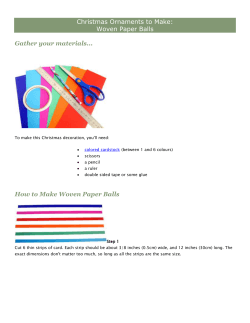
PTS Panels® Multi-Chemistry Controls
PTS Panels® Multi-Chemistry Controls for use with CardioChek® Brand Analyzers INTENDED USE Use these controls with PTS Panels test strips as quality control materials to check for proper performance of your test system. SUMMARY AND EXPLANATION PTS Panels Multi-Chemistry Controls contain cholesterol, triglycerides, glucose, and ketone, which react with test strips to produce color or an electrical current depending on the test strips used. The result for each level of control should be in the range specified on the Quality Control Range Card included with these materials. Controls should be run to verify the test system performance, when results are questionable, or to comply with your facility’s quality control requirements. CHEMICAL COMPOSITION PTS Panels Multi-Chemistry Controls contain glucose, glycerol, cholesterol, DL-β-Hydroxybutyric Acid, preservatives, and inert ingredients. PRECAUTIONS • • • Do not eat or drink contents. For in vitro diagnostic use. Intended for self-testing. Avoid contact with eyes or skin. STORAGE AND HANDLING Store in a cool, dry place at room temperature of 68-86°F (20-30°C). May be stored in a refrigerator at 35-46°F (2-8°C). Do not freeze. Product is ready to use and is clear. Discard if it appears cloudy. Recap after using. Use care not to contaminate dropper tip. Do not use beyond the expiration date on the vial. Opened product is stable for at least ten months at room temperature. • • • • Remove cap and turn bottle upside down straight above reflectance test strip sample application window or to the tip of the electrochemical test strip. Carefully, squeeze vial to deliver one drop of control solution on the reflectance test strip and/or one drop of control solution to the tip of the electrochemical test strip. Replace control vial cap. Reflectance Results will be displayed test strip in about 2 minutes for Electrochemical reflectance tests and about test strip* 10 seconds for electrochemical tests. *CardioChek Plus analyzers only. EXPECTED RESULTS Results for the control should be within the range specified on the Quality Control Range Card. The control results are also available on the PTS, Inc. website: www.cardiochek.com. If test results are above or below the range specified, check to see if the test strips or Controls are expired. If they are expired, test again with unexpired test strips and controls. Clean the analyzer before retesting (See User Guide). For customer service and/or technical support call PTS, Inc. Customer Service at: +1-877-870-5610 (Toll-free, inside U.S.) or +1-317-870-5610 (Direct). email: inforequest@cardiochek.com Authorized European Representative MDSS GmbH Schiffgraben 41 30175 Hannover, Germany PROCEDURE Materials provided: Two (2) vials of Multi-Chemistry Control Materials (one each of Level 1 and Level 2) Materials required, but not provided: • CardioChek Brand Analyzer • PTS Panels Test Strips and MEMo Chip® of same lot number PLEASE READ INSTRUCTIONS CAREFULLY BEFORE TESTING Test Procedure: Please refer to analyzer User Guide for the proper procedure on how to run a quality control test. The following procedure applies to the CardioChek brand analyzers: • Insert MEMo Chip that matches the lot of strips. • Press one of the two buttons to turn the instrument ON. • Press the NEXT button until the display reads UTILITY. • Press the ENTER button. • Press the NEXT button until RUN (LIQUID) CONTROL is displayed. • At the RUN (LIQUID) CONTROL analyzer display option, press ENTER. • Insert the reflectance test strip and/or electrochemical test strip into analyzer. • Wait until analyzer displays APPLY SAMPLE. • Invert to mix control. PS-000597 E Rev. 6 07/13 0197 Manufactured by Polymer Technology Systems, Inc. Indianapolis, IN 46268 USA Copyright © 2013 Polymer Technology Systems, Inc. Use By Catalog number Manufacturer Lot number IVD In vitro diagnostic medical device Temperature limitation Consult instructions for use 0197 This product fulfils the requirements of the European Directive 98/79 EC for in vitro diagnostic medical devices. Authorized representative in the European Community Control
© Copyright 2025











